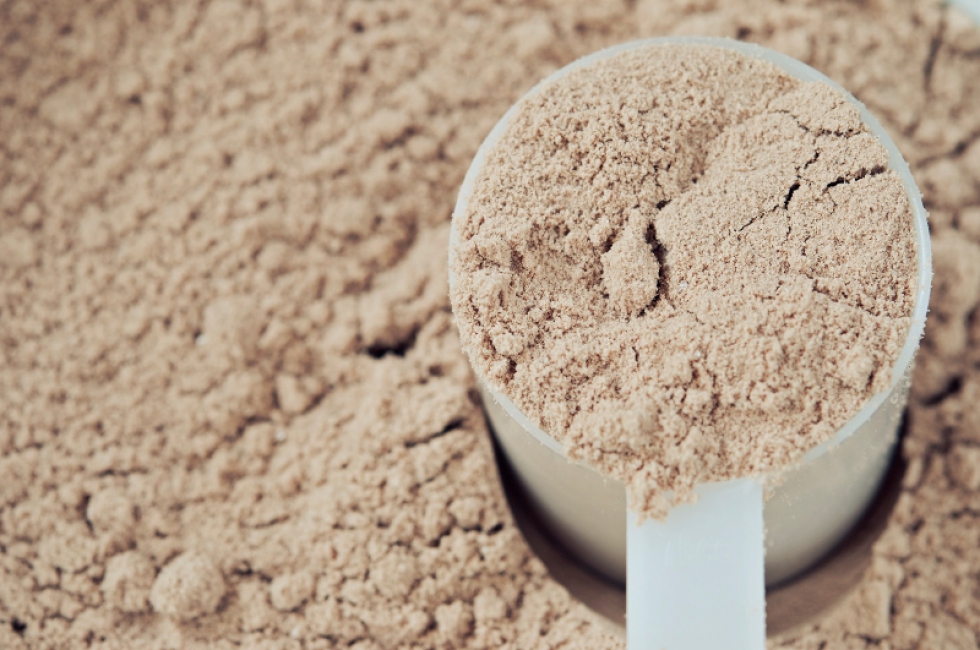Protein guideProtein is essential for muscle growth and maintaining a lean muscle mass. This time we will tell you all about proteins, their use and types.
What is protein and why is it important?
The word 'protein' comes from Greek and it means ‘of primary importance'. And rightly so: energy for your body is provided by three macronutrients, protein, fat and carbohydrate.
Protein is a linked chain of amino acids. Amino acids are your body’s primary source of nitrogen. Your body needs a positive nitrogen balance for muscle growth and recovery; however, proteins also have several other functions besides their muscle building properties.
Proteins and muscle growth
Increasing your daily protein intake while doing weight training can effectively support the growth of your muscle mass. The circulation of proteins in the human body is constant; muscle tissues are continuously regenerated and replaced. In order to maximise this process, you need to ensure a continuous positive nitrogen balance, which you can achieve by additional protein intake.
If your protein intake is insufficient, your muscles will be unable to recover and your body will break them down. But insufficient protein intake can also have a negative effect on a number of bodily functions which require protein (e.g. hormone control, pH of blood, etc.).
When doing weight training, more than the normal amount of muscle tissue needs to be recovered, and therefore weightlifters, power lifters and bodybuilders need an increased protein intake to ensure the necessary amount continuously.
Proteins and weight loss
Since their digestion needs more energy, protein-rich foods have a thermogenic effect. In order to process proteins, your body needs to work 30% harder than in the case of carbohydrates or fats. Consequently, the consumption of protein-rich foods increases metabolism.
You also need the right amount and quality of proteins to mobilise your fat reserves. If your protein intake is insufficient, your body will choose to break down the muscle tissues to gain energy.
Proteins and recovery
Protein has a fundamental role in the recovery of muscle tissues. During your workout, two things happen:
If protein supply is continuous, your body has a positive nitrogen balance and muscle recovery begins immediately after workout. The faster this process, the more quickly muscle tissues are built and you can begin your next training session.
Nutritional supplements as a source of protein
Nutritional supplements can contain various protein sources. What's the difference between them?
Whey protein:
Whey accounts for about 20% of the protein content of milk. A by-product of cheese production, whey is today the most popular source of protein among athletes. Due to its high biological value, your body utilizes whey very efficiently, which also has a high BCAA content. By default (with no added amounts), it has a low Glutamine and Arginine content.
a more cost-effective version of whey protein. It has a more simple production technology, takes less time to produce than whey isolate and it contains a little more fat and lactose. Considering its price-to-value ratio, it’s a particularly good choice for athletes doing weight training.
It’s a more expensive version of whey. It has a higher content of quality protein and a higher biological value. It contains less fat and lactose than whey concentrate. Its unflavoured version can contain over 90% of protein, whereas whey concentrate has only about 80%. It's the best choice for a diet. Through a pre-digestion process, an even purer protein source can be produced – it's called whey hydrolysate.
A mixture of isolate and concentrate. By combining the advantages of the two protein sources, it offers a high-quality protein source of excellent price-to-value ratio.
Casein:
Casein accounts for 80% of the protein content of milk. It’s a slow absorbing protein, with a nice, rich flavour. That is exactly why it’s commonly used in mass gainers. Although its biological value is lower than that of whey protein, it is more effective in muscle building, as your body uses casein to build muscles, rather than as a source of energy. It also has a high Glutamine content.
Egg white (albumin):
It has a high content of essential and non-essential amino acids and less cholesterol than a whole egg. Many consider eggs the king of protein sources. Biological value is also measured against eggs; therefore, egg white protein was given a value of 100. It’s the best protein source for those sensitive to lactose.
Soy protein:
Although it’s a high-quality protein, it’s not as effective as milk based proteins. It’s easy to digest, with an average amino profile. It has a lower biological value than whey proteins, but it can be a good choice to ensure protein intake when money is short. It’s also a popular choice among those sensitive to milk as well as vegans.
Wheat protein:
It’s a healthy and natural alternative to milk and egg based proteins. It’s free of lactose and cholesterol, which makes it an excellent choice for vegetarian bodybuilders and other athletes. It has a high Glutamine content. It’s a second class protein source, with a low biological value.
Pea protein:
It’s a 100% gluten-free protein source, also a good choice for vegetarians. It’s free of lactose and cholesterol, easy to digest and a rich source of protein. Currently, it’s not very wide-spread, although its production is more environment-friendly than that of whey proteins.
Whole milk protein:
Dried protein extracted from milk, with carbohydrate and fat removed. It’s extremely nourishing, with a high calcium and considerable vitamin and mineral content. Whole milk protein contains both whey and casein.
The advantages of protein shakes
When should I drink protein shakes? When it comes to proteins, timing is very important for the best results. It’s important that you should find the best tasting and most effective protein source, but you should also pay attention to timing, so you can fully enjoy the benefits of protein shakes:
When else should I take proteins?
Proteins and carbohydrates to gain mass When in the mass gaining period, combine your proteins with high-quality carbohydrates. For this purpose, pre-mixed mass gainer supplements are great, but you can also prepare them from the necessary ingredients if you want to take exact amounts.
High-quality carbohydrates contribute to the transport and utilisation of proteins. Carbohydrate intake causes blood sugar levels to increase, which your body tries to restore by releasing insulin. Insulin is an anabolic hormone which directs nutrients in the blood to the cells. Thus, Amino acids in the blood stream can get to the muscle cells more easily, too, and in addition, the glycogen stores depleted during hard training are also quickly replenished, which supports recovery.
|





